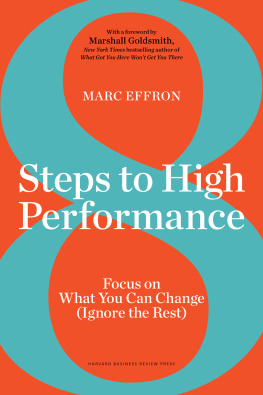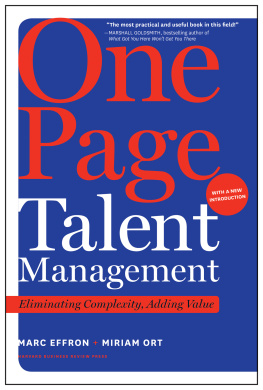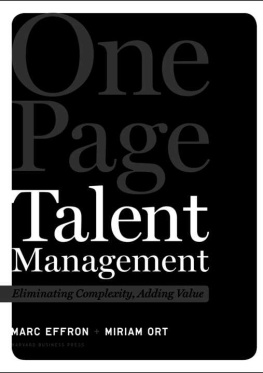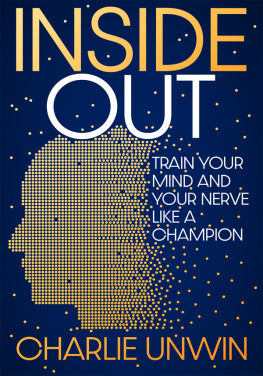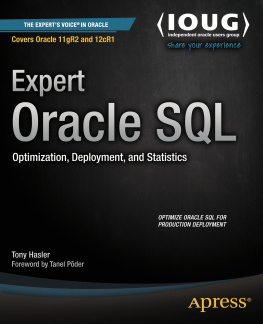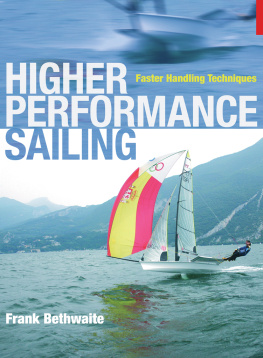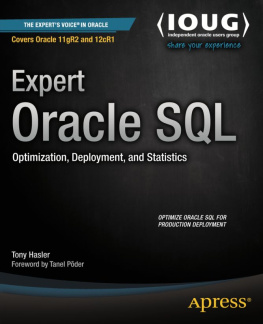Harvard Business Review Press titles are available at significant quantity discounts when purchased in bulk for client gifts, sales promotions, and premiums. Special editions, including books with corporate logos, customized covers, and letters from the company or CEO printed in the front matter, as well as excerpts of existing books, can also be created in large quantities for special needs.
For details and discount information for both print and ebook formats, contact .
No part of this publication may be reproduced, stored in or introduced into a retrieval system, or transmitted, in any form, or by any means (electronic, mechanical, photocopying, recording, or otherwise), without the prior permission of the publisher. Requests for permission should be directed to , or mailed to Permissions, Harvard Business School Publishing, 60 Harvard Way, Boston, Massachusetts 02163.
So many people have shaped how I think about and approach my work on high performance. Thank you to everyone who has taught me, challenged me, supported me, and guided me over the years. My special thanks to my wife, Michelle, for her unfailing love and support for more than thirty years.
FOREWORD
by Marshall Goldsmith
Marc Effron, author of Leading the Way and One Page Talent Management , offers an exceptional road map for achieving our highest potential and our greatest level of performance in this, his latest book, 8 Steps to High Performance .
I immediately knew I was going to love this book when Marc told me he bases it on a statement made by the father of modern management, Peter Drucker. As with many of my own greatest insights on leadership, which are based on what I learned personally from Peter Drucker, Marc bases this work on Peters philosophy: Do not try to change yourself. You are unlikely to succeed. But work hard to improve the way you perform.
There are eight steps suggested in this exceptional book. All are important to your goal of achieving peak high performance. One on which Id love to offer a little insight to you is step six, Fake it. I love this step. Marc describes it as follows: A high performer cares about showing the right behaviors, not being their genuine self. Youll learn that faking behaviors works, why its sometimes better than being the genuine you, and the situations where faking a new behavior matters most.
I refer to this as Showtime. I am inspired by great theater. Every night, great performers pour their hearts into each production. Some have headaches, some have family problems, but it doesnt matter. When its showtime, they give it all they have. Although it might be the thousandth time an actor has performed the part, it might be the first time the audience member sitting in the fourth row has seen the production. To the true performer, every night is opening night.
And like great actors, high achievers sometimes need to be consummate performers. When they need to motivate to get a project completed, to inspire people around them, or to build teams for certain projects that otherwise might not fit, they do it. It doesnt matter if they have a headache; it doesnt matter if they have a personality conflict. They do whatever it takes to help their organization succeed. When they need to be on, like the Broadway stars, its showtime. Its a tough lesson, but one that the greatest leaders Ive ever met have learned and learned well.
This is just one of the many things youll learn when you pick up 8 Steps to High Performance. Because it is research-based and includes self-assessments and tools to gauge your progress in realizing the performance you are trying to achieve, it is an application book of the highest level.
Follow the eight steps that Marc outlines here and you will reach your peak performance goals!
Life is good.
Marshall Goldsmith
The international best-selling author or editor of thirty-five books, including What Got You Here Wont Get You There and Triggers
PREFACE
I wish that, as a young man, someone had sat me down and said to me, Marc, Im going to tell you how to be highly successful at work. A few of the things I describe may come naturally to you, and others might require significant effort. You may believe that some of what I tell you will work well and that some wont. But I can promise that everything I tell you will help you to perform and, the more of it you do, the more successful you will be.
No one gave me that gift, and I doubt that many of you received it either. Thats unfortunate, because the lack of those insights makes our quest for high performance more challenging than it needs to be. Since we dont know what has been proven to work, we do our best to sort through the performance advice we get from books, bosses, friends, and the internet. That advice may be highly accurate or total folklore; its difficult to know which it is until we try it. Our quest for high performance is often guided by trial and error, as we do what we think is right and then hope for the best results.
Its even more unfortunate that these conversations dont occur because we know exactly what helps people to be high performers. Thats correct. There is clear, conclusive science that describes exactly how individuals can improve their performance at work. These arent platitudes like keep your head down and work hard, but specific actions, such as how to set goals, how to behave in order to drive results, and how to accelerate your development. So, if these facts are well known, why dont those conversations happen?
The challenge is that those powerful, performance-improving insights are hidden in dusty academic journals like individual pieces of a larger puzzle. The average Jill or Joe isnt a PhD research scientist, so would never sort through the original research to find those insights or know how to assemble the many pieces into a coherent picture.
Perhaps most challenging, these insights are rarely presented in a way that you can practically apply them at work. When the insights occasionally find their way into a book or article, its typically one written by a consultant or journalist who understands the topic but has never had to apply the concept in the real world. Their advice may be technically accurate, but it often ignores the practical realities of busy people, competing priorities, or unsupportive bosses.
If we could gather these great insights, sort through them to identify which matter most, and make them practical, applicable, and easy to understand, we could enable anyone to become a high performer. This knowledge would democratize high performance by making it available to everyone, rather than just a lucky, privileged few. Thats the purpose of 8 Steps to High Performance .
I wrote this book so that anyone can be a high performer. As a corporate executive and management consultant, I have seen too many smart people underperform because they didnt know or believe in the eight steps. These potential stars derailed their careers by relying on their one overwhelming strength for success (e.g., work harder; develop yourself even more) until they hit a performance wall by ignoring the other seven steps. Other leaders rejected great advice to build a network or change certain behaviors because they didnt believe it would improve their performance. All of these smart, highly capable people left performance on the table and lost out on the wonderful benefits that being a high performer brings.

